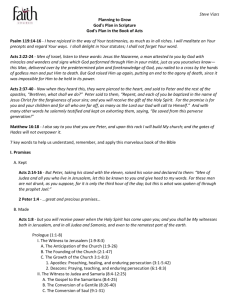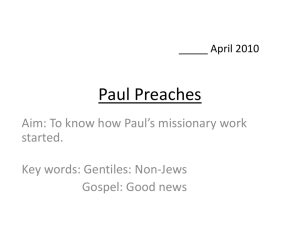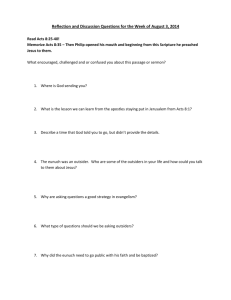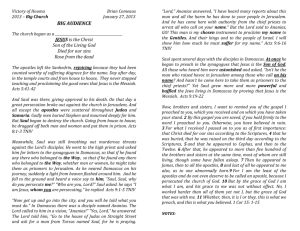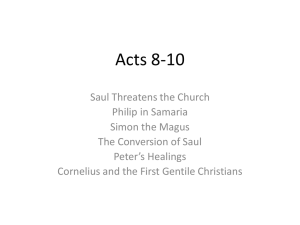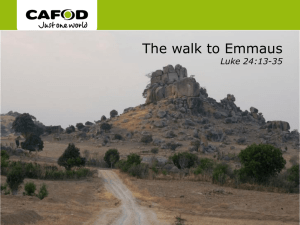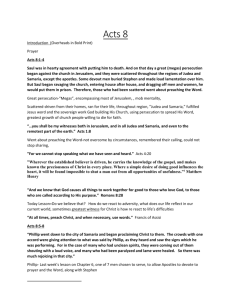Acts 8: Saul's Persecution, Philip in Samaria, Ethiopian Conversion
advertisement
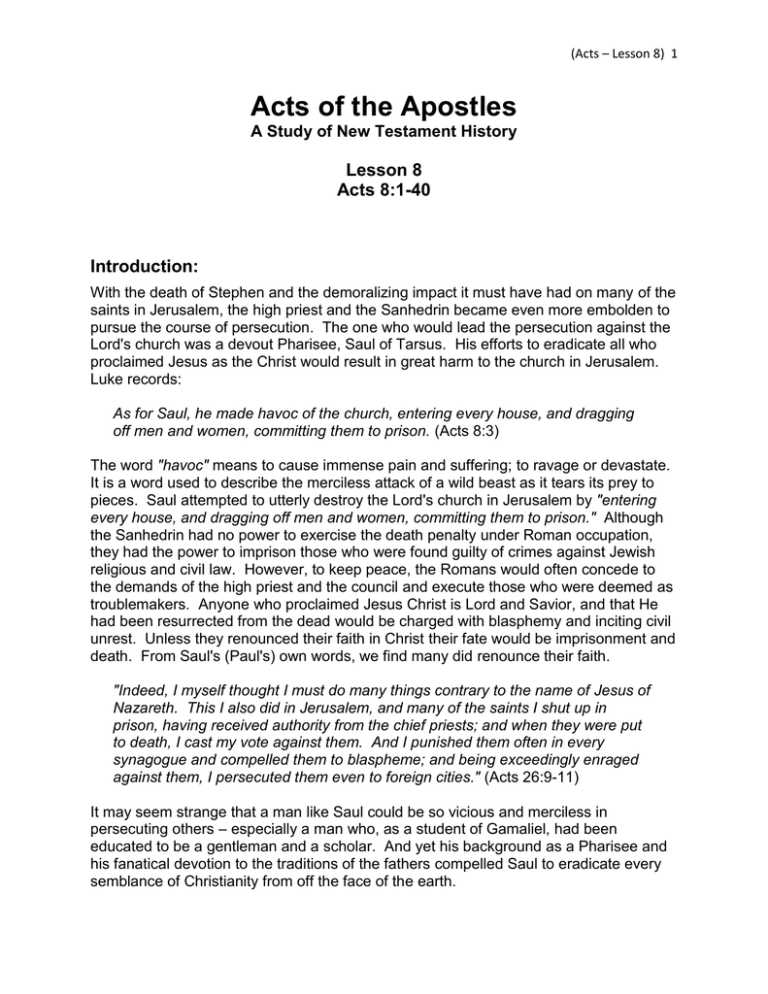
(Acts – Lesson 8) 1 Acts of the Apostles A Study of New Testament History Lesson 8 Acts 8:1-40 Introduction: With the death of Stephen and the demoralizing impact it must have had on many of the saints in Jerusalem, the high priest and the Sanhedrin became even more embolden to pursue the course of persecution. The one who would lead the persecution against the Lord's church was a devout Pharisee, Saul of Tarsus. His efforts to eradicate all who proclaimed Jesus as the Christ would result in great harm to the church in Jerusalem. Luke records: As for Saul, he made havoc of the church, entering every house, and dragging off men and women, committing them to prison. (Acts 8:3) The word "havoc" means to cause immense pain and suffering; to ravage or devastate. It is a word used to describe the merciless attack of a wild beast as it tears its prey to pieces. Saul attempted to utterly destroy the Lord's church in Jerusalem by "entering every house, and dragging off men and women, committing them to prison." Although the Sanhedrin had no power to exercise the death penalty under Roman occupation, they had the power to imprison those who were found guilty of crimes against Jewish religious and civil law. However, to keep peace, the Romans would often concede to the demands of the high priest and the council and execute those who were deemed as troublemakers. Anyone who proclaimed Jesus Christ is Lord and Savior, and that He had been resurrected from the dead would be charged with blasphemy and inciting civil unrest. Unless they renounced their faith in Christ their fate would be imprisonment and death. From Saul's (Paul's) own words, we find many did renounce their faith. "Indeed, I myself thought I must do many things contrary to the name of Jesus of Nazareth. This I also did in Jerusalem, and many of the saints I shut up in prison, having received authority from the chief priests; and when they were put to death, I cast my vote against them. And I punished them often in every synagogue and compelled them to blaspheme; and being exceedingly enraged against them, I persecuted them even to foreign cities." (Acts 26:9-11) It may seem strange that a man like Saul could be so vicious and merciless in persecuting others – especially a man who, as a student of Gamaliel, had been educated to be a gentleman and a scholar. And yet his background as a Pharisee and his fanatical devotion to the traditions of the fathers compelled Saul to eradicate every semblance of Christianity from off the face of the earth. (Acts – Lesson 8) 2 However, Saul's persecution had just the opposite effect. Rather than destroy the disciples of Jesus Christ, those who fled from Jerusalem and the surrounding countryside would take the message of a risen Savior with them everywhere they went. Saul's persecution against the church did more to spread of Christianity than it did to stamp it out. In fact, Saul single-handedly helped fulfill the prophecy of Jesus Christ: ". . .and you shall be witnesses to Me in Jerusalem, and in all Judea and Samaria, and to the end of the earth." (Acts 1:8) The gospel of Christ had already spread throughout the city of Jerusalem and the surrounding towns and villages as the apostles performed great signs and wonders. And believers were increasingly added to the Lord, multitudes of both men and women, so that they brought the sick out into the streets and laid them on beds and couches, that at least the shadow of Peter passing by might fall on some of them. Also a multitude gathered from the surrounding cities to Jerusalem, bringing sick people and those who were tormented by unclean spirits, and they were all healed. (Acts 5:14-16) The irrefutable message that Jesus Christ had risen from the dead and was now at the right hand of God had persuaded countless thousands, including many of the priests. Then the word of God spread, and the number of the disciples multiplied greatly in Jerusalem, and a great many of the priests were obedient to the faith. (Acts 6:7) And now, with the persecution of Saul, the gospel would be taken into Samaria through the preaching of Philip (Acts 8:4-25), and eventually into all the world beginning with the conversion of the Ethiopian eunuch, the treasurer of Candace, queen of the Ethiopians (Acts 8:26-40). Memorization: As for Saul, he made havoc of the church, entering every house, and dragging off men and women, committing them to prison. Therefore those who were scattered went everywhere preaching the word. (Acts 8:3-4) Key Events of Acts 8: Saul persecutes the church in Jerusalem. Philip preaches in Samaria. Conversion of the Ethiopian eunuch. (Acts – Lesson 8) 3 Link to Online Bible Study Tools: These websites contain numerous Bible Versions and Translations, Concordances, Dictionaries, Lexicons and many other useful tools: http://biblos.com/ and http://www.biblestudytools.com/ (Click on "Our Library" at the top of the home page) The Exposition: I. Saul's persecution of the church in Jerusalem (Acts 8:1-3) A. Burial of Stephen (Acts 8:1-2) 1. Why do you think the apostles stayed in Jerusalem when others fled? What would have been the impact on other believers if the apostles had also fled Jerusalem? 2. What does the manner of Stephen's burial say about him and those who cared for him? B. Saul made havoc of the church (Acts 8:3) 1. In your own words explain why Saul went to such extremes to destroy the Lord's church in Jerusalem? (See: Acts 22:2-5; 23:1; 26:9-11; Phil 3:3-6) (Acts – Lesson 8) 4 II. Philip preaches in Samaria (Acts 8:4-25) A. Philip preaches Jesus (Acts 8:4-8) 1. Explain why the disciples would continue to preach the word as they were scattered by persecution? What does this say about them? 2. On the map below identify the approximate locations of Jerusalem, Judea, Samaria, the city of Samaria, the Sea of Galilee, the Jordan River, and the Dead Sea. (Acts – Lesson 8) 5 3. Give a brief history of Samaria and the Samaritan people, and explain their relationship with others Jews in Palestine. (Consult a Bible dictionary) B. The impact of Philip's preaching (Acts 8:9-13) 1. Who is Philip, and where do we first read about him? 2. Who is Simon and what was his profession? Do you believe he had the ability to perform miracles as "the great power of God"? 3. What were the two things those who were baptized believed? Explain what each implies. a. b. (Acts – Lesson 8) 6 4. What else does Acts 8:12 tell us about those who were baptized, and how can this be used to defeat the concept of infant baptism? 5. How did Philip confirm the word he preached, and where did he get this power? (Cite the scriptures) 6. What makes us think Simon was truly a believer in Christ, and that he was saved? C. Laying on of the apostles' hands (Acts 8:14-17) 1. Why did the apostles in Jerusalem send Peter and John to Samaria? 2. Why had the people of Samaria not yet received the Spirit, despite the fact that they had already been baptized? (Acts – Lesson 8) 7 3. Does this indicate the "gift of the Holy Spirit" (Acts 2:38) is different from "Holy Spirit" the people of Samaria received (Acts 8:15-17)? Explain. 4. What does this tell us about the ability to pass on spiritual gifts through the laying on of hands? D. Simon the Sorcerer's Sin (Acts 8:18-25) 1. What was Simon's sin? Explain your answer. 2. Why would Simon have offered money for the ability to pass on spiritual gifts to others? 3. What did Peter say about the condition of Simon's heart? (Acts – Lesson 8) 8 4. Explain why Peter told Simon, "Repent therefore of this your wickedness, and pray God if perhaps the thought of your heart may be forgiven you." 5. Explain Simon's spiritual condition at that moment (see Acts 8:23). Was Simon in a lost condition? 6. Some argue that Simon could not have been saved prior to this sin because they believe it is impossible for those truly converted to Christ to sin so as to be eternally lost. Explain why this would be false. 7. What did Simon request, and why? Explain your answer. III. Conversion of the Ethiopian eunuch (Acts 8:26-40) A. Philip preached Jesus to him (Acts 8:26-35) 1. On the map above, identify the area of Gaza. (Acts – Lesson 8) 9 2. What can we assume about an Ethiopian coming to Jerusalem to worship? 3. What passage was he reading, and what is so significant about this prophecy? 4. How did Philip preach Jesus to the eunuch? What did Philip obviously include in his preaching of Jesus? B. The eunuch is baptized (Acts 8:36-40) 1. What does the eunuch's statement (Acts 8:36) tell us about his understanding of the role of baptism in conversion? 2. What is the significance of both Philip and the eunuch going "down into the water" and coming "up out of the water"? Explain how this teaches baptism is by immersion. (Acts – Lesson 8) 10 3. What was the eunuch's reaction to having been baptized? Why? Application: Be prepared to discuss what lessons can learn from these events, and how those lessons can be applied to present-day situations.
